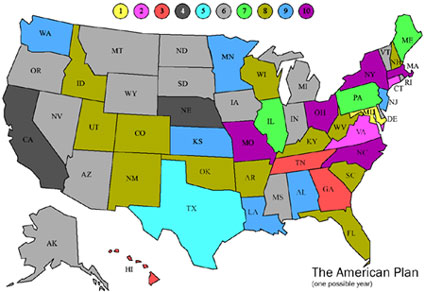|
The American Plan 
Summary The Graduated Random Presidential Primary System, or The American Plan (sometimes known as the California Plan), is designed to begin with contests in small-population states, where candidates do not need tens of millions of dollars in order to compete. A wide field of presidential hopefuls will be competitive in the early going. A "minor candidate's" surprise successes in the early rounds, based more on the merit of the message than on massive amounts of money, will tend to attract money from larger numbers of small contributors for the campaign to spend in later rounds of primaries. Thus there should be more longevity of candidacy, and more credible challengers to the "front-runners." However, as the campaign proceeds, the aggregate value of contested states becomes successively larger, requiring the expenditure of larger amounts of money in order to campaign effectively. A gradual weeding-out process occurs, as less-successful candidates drop out of the race. The goal is for the process to produce a clear winner in the end, but only after all voices have had a chance to be heard. How it Works The system features a schedule consisting of ten intervals, generally of two weeks, during which randomly selected states may hold their primaries. In the first interval, states with a combined total of eight congressional districts would hold their primaries, caucuses, or conventions. This is approximately equal to the total number of congressional districts in Iowa (5) and New Hampshire (2), thus preserving the door-to-door "retail politicking." Any state or combination of states amounting to a total of eight congressional districts could be in the first round of primaries and caucuses, including areas that have large proportions of people of color. The District of Columbia, Guam, Puerto Rico, and the Virgin Islands, which also send delegates to both national conventions, are each counted as one district in this system. In the second period--two weeks later--the eligibility number would increase to 16 (8 x 2). In the baseline design of the American Plan, every two weeks, the combined size of the contests would grow by eight congressional districts, until a combination of states totaling 80 congressional seats (8 x 10)--nearly one-fifth of the total--would be up for grabs in the tenth and last interval toward the end of June. Because our biggest states are much more populous than the other states, this baseline design would allow California, which has 53 districts, to vote no earlier than the seventh interval, in which the eligibility number is 56 (8 x 7). To put California on equal footing with the other populous states, the order of Rounds 4 through 10 is staggered: 8, 16, 24, 56, 32, 64, 40, 72, 48, 80. With this adjustment, the four most populous states are all eligible to vote by the fourth of ten rounds. Since only eleven percent of the American electorate votes in the first three intervals, these large states can figure early enough in the delegate selection process to have as meaningful an input as any state. The American Plan treats all states even-handedly; on average, the smallest states are scheduled at random to vote after 32.5% of the country has voted, but for the largest states this figure is no higher than 45.5%, a spread of only 13 points. |
Fix the Primaries: Senator Bill Brock
Former US Senator
(R - Tennessee) Damian Carroll
President
San Fernando Valley Young Democrats David Phelps
Executive Board Member
California Democratic Party Rob Richie
Executive Director
FairVote Tom Sansonetti
Former Assistant Attorney General of the Environment and Natural Resources Division of the Department of Justice
Prof. Larry Sabato
Center for Politics
University of Virginia Tova Wang
Vice President of Research
Common Cause Professor Marilyn Dudley-Flores
CEO, OPS-Alaska
Sonoma State University California Democratic State Central Committee |
|
rr@fairvote.org
(301) 270-4616 6930 Carroll Ave Suite 610 Takoma Park, MD 20912 |


